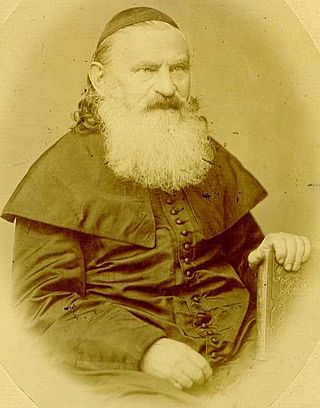
Judah Loew ben Bezalel, also known as Rabbi Loew, the Maharal of Prague, or simply the Maharal, was an important Talmudic scholar, Jewish mystic, mathematician, astronomer, and philosopher who, for most of his life, served as a leading rabbi in the cities of Mikulov in Moravia and Prague in Bohemia.
In early modern Europe, particularly in Germany, a court Jew or court factor was a Jewish banker who handled the finances of, or lent money to, royalty and nobility. In return for their services, court Jews gained social privileges, including, in some cases, being granted noble status.
In Jewish law and history, Acharonim are the leading rabbis and poskim living from roughly the 16th century to the present, and more specifically since the writing of the Shulchan Aruch in 1563 CE.

Mikulov is a town in Břeclav District in the South Moravian Region of the Czech Republic. It has about 7,700 inhabitants. The historic centre of Mikulov is well preserved and is protected by law as an urban monument reservation.
Landesrabbiner are spiritual heads of the Jewish communities of a country, province, or district, particularly in Germany and Austria. The office is a result of the legal condition of the Jews in medieval times when the Jewish communities formed a unit for the purposes of taxation. As the community had to pay certain taxes to the government, the latter had to appoint someone who should be responsible to it for their prompt collection, and who consequently had to be invested with a certain authority. The office of Landesrabbiner had no ecclesiastical meaning until the 18th century, when the various governments began to consider it their duty to care for the spiritual welfare of the Jews. Such ecclesiastical authority, owing to the strictly congregational constitution of the communities, never took root among the Jews.

Meir Friedmann was an Austrian-Hungarian Jewish scholar. His editions of the Midrash are the standard texts. His chief editions were the Sifre (1864), the Mekhilta (1870), Pesiqta Rabbathi (1880). At the time of his death he was editing the Sifra. Friedmann, while inspired with regard for tradition, dealt with the Rabbinic texts with modern scientific methods, and rendered conspicuous service to the critical investigation of the Midrash and to the history of early homilies.

Rabbi Gershon Shaul Yom-Tov Lipmann ben Nathan ha-Levi Heller, was a Bohemian rabbi and Talmudist, best known for writing a commentary on the Mishnah called the Tosefet Yom-Tov (1614–1617). Heller was one of the major Talmudic scholars in Prague and in Poland during the "Golden Age" before 1648.

Judah Leib "Leopold" Löw was a Hungarian rabbi, regarded as the most important figure of Neolog Judaism.
The Jewish family Auerbach, Авербах of the 16th to 19th century was a family of scholars, the progenitor of which was Moses Auerbach, born around 1462, court Jew to the bishop of Regensburg as of around 1497. One of his daughters, who went to Kraków after her marriage, is the reputed ancestress of the celebrated Rabbi Moses Isserles. The Auerbach family gained Court Jew status and later nobility titles under the Habsburg monarchy. The name, Auerbach means, "the stream that comes from the meadow, meadow brook". Auerbach is the name of several places in Southern German.

The Siebengemeinden were seven Jewish communities located in Kismarton and its surrounding area. The groups are known as Sheva Kehillot in Hebrew.

Samson Wertheimer was chief rabbi of Hungary and Moravia, and rabbi of Eisenstadt. He was also a powerful Austrian financier, court Jew and Shtadlan to Austrian Emperor Leopold I. With the help of Samuel Oppenheimer, he helped finance the Spanish War of Succession on behalf of the Empire.
Menahem Mendel ben Meshullam Auerbach was an Austrian rabbi, banker, and commentator born in Vienna at the beginning of the 17th century. He was descended from the well-known Auerbach-Fischhof family, both his father, Meshullam Solomon, and his maternal grandfather, Rabbi Judah Loeb Rofe, being members of the Vienna Ghetto.
Nehemiah Hiyya ben Moses Hayyun was a Bosnian Kabalist, described by scholars as linked to Sabbateanism. His parents, of Sephardic descent, lived in Sarajevo, Bosnia, where he was most likely born, though later in life he pretended that he was a Palestinian emissary born in Safed. He received his Talmudic education in Hebron.

David Kaufmann was a Jewish-Austrian scholar born at Kojetín, Moravia. From 1861 to 1867 he attended the gymnasium at Kroměříž, Moravia, where he studied the Bible and Talmud with Jacob Brüll, rabbi of Kojetín, and with the latter's son Nehemiah.
Abraham Samuel Bacharach was a Rabbi, born about 1575; died in Gernsheim, Electorate of Mainz, May 26, 1615. He seems to have come from the city of Worms, but is first met with at Prague, where, in 1600, he married Eva, the granddaughter of the chief rabbi of Prague, Judah Loew ben Bezalel. He was rabbi in Turbin, Kolín (Bohemia), and in Pohrlitz (Moravia); and was subsequently called to the ministry of the very important congregation of Worms. One of the frequent riots against the Jews, instigated by the guilds, caused him to flee from the city. He died during exile, and was buried in Alsbach. Bacharach was respected for his learning and piety. He took a firm stand against the rabbis of Frankfurt, who arrogated to themselves preeminence over all the other rabbis of Germany. A few of his responsa were published by his grandson, Jair Ḥayyim, in the collected "Ḥut ha-Shani". Bacharach was the author of an essay on the Jewish calendar, a number of apologetic works against Christianity, liturgical poems, and casuistic treatises. Some of his works are still extant in manuscript.
Jakob Koppel Fränkel was a wealthy Austrian-Jewish banker and court Jew.
Abraham Placzek was a Moravian rabbi, who served as Landesrabbiner of Moravia from 1851 until his death.

Baruch Jeitteles was a Jewish scholar, writer, and doctor from Bohemia, associated with the Jewish Enlightenment movement (Haskalah). His teachers were Rabbi Yechezkel Landau of Prague and later Moses Mendelssohn of Berlin.








